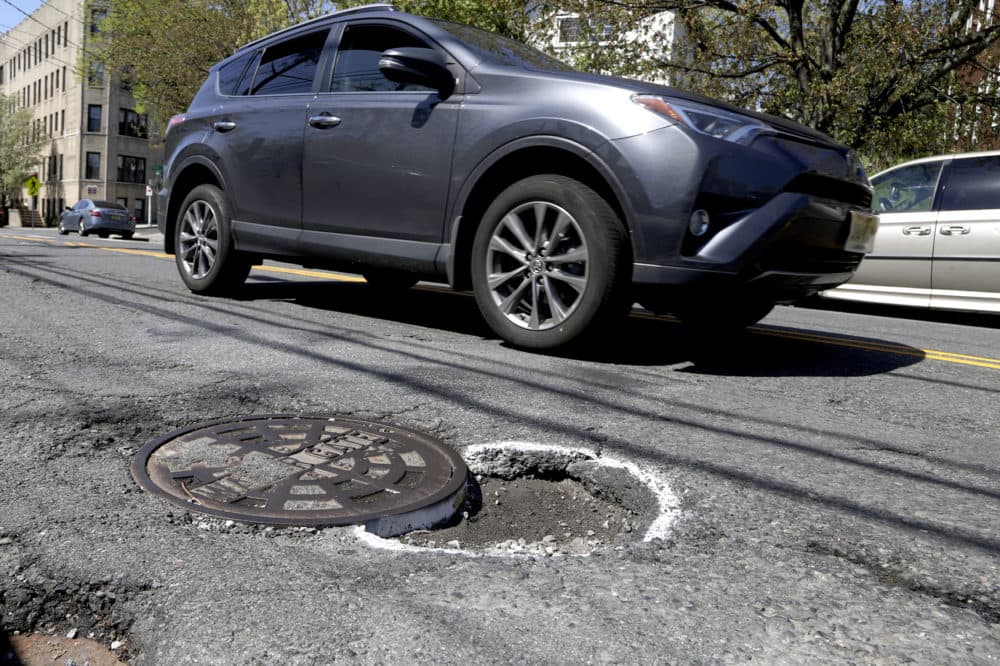Advertisement
There's Talk Of $2 Trillion For Infrastructure. How Should The U.S. Spend It?
Resume
NOTE FOR LISTENERS: Due to issues with our phone lines, we're using a different number for today's broadcast. Please call in at 1-888-899-9287, toll free.
With Meghna Chakrabarti
President Trump and Democratic leaders say they’ll champion a $2 trillion infrastructure package. It’s purely aspirational for now. But let’s think big — how would you spend it?
Guests
Tanya Snyder, transportation for Politico. (@TSnyderDC)
Stan Caldwell, executive director of Mobility21 National University Transportation Center, one of five U.S. Department of Transportation university research centers. Professor of Transportation and Public Policy, Carnegie Mellon University. (@HeinzCollege)
From The Reading List
Politico: "7 reasons not to buy the infrastructure hype" — "Tuesday’s infrastructure meeting between President Donald Trump and congressional Democrats was more positive and constructive than anyone expected — but there are still good reasons for skepticism on the two sides' ability to accomplish a $2 trillion infrastructure package. Here are seven:
"1) No one knows where the money will come from: This question has stymied big infrastructure hopes for decades, even as the nation's backlog of unrepaired roads, rails, airports and other needs have grown. Congress hasn't found any new way to pay for infrastructure since 1993, the last time it increased the the 18 cents-per-gallon federal gasoline tax, even as inflation eats away at that levy's spending power.
"Signs were few Tuesday that today's legislators are any more ready to raise the gas tax, or embrace some other new pot of federal dollars to pay for a big plan."
New York Times: "Trump and Democrats Agree to Pursue $2 Trillion Infrastructure Plan" — "Democratic congressional leaders emerged from a meeting at the White House on Tuesday and announced that President Trump had agreed to pursue a $2 trillion infrastructure plan to upgrade the nation’s highways, railroads, bridges and broadband.
"Senator Chuck Schumer, the minority leader, said that there had been 'good will' in the meeting and that it was 'different than some of the other meetings that we’ve had.' Standing alongside Speaker Nancy Pelosi, he said the group planned to meet again in three weeks, when Mr. Trump was expected to tell them how he planned to actually pay for the ambitious project.
"The first substantive sit-down between Mr. Trump and Democratic leadership since the 35-day government shutdown last winter unfolded at a tense moment.
"Since their last meeting at the White House, the special counsel released his 448-page report detailing Mr. Trump’s monthslong effort to thwart an investigation that loomed over his presidency. Ms. Pelosi, since then, has tried to caution her colleagues against impeaching the president, while facing growing pressure from her caucus and from 2020 Democratic presidential contenders to do so."
CityLab: "What the '$1.5 Trillion Infrastructure Plan' Really Pays For" — "It’s been more than a year since Donald Trump’s presidential campaign started talking about a $1 trillion infrastructure plan. On Monday, the White House released an actual 55-page legislative outline.
"In the intervening 16 months, the details have shifted, several unofficial Infrastructure Weeks have come and gone, and the total investment that’s being articulated has ballooned to $1.5 trillion. But the underlying philosophy hasn’t budged: This not a spending plan, but a financing idea. Trump’s bill does not include new money for funding infrastructure.
"In fact, taken alongside the White House’s budget request for 2019, also released on Monday, infrastructure spending is actually in for a net reduction. The Center for American Progress said in a press call on Monday that the organization counted $281 billion in cuts to infrastructure programs in the proposed budget.
"The crux of the infrastructure bill, based on a document uploaded to Scribd by a Business Insider reporter, is to dole out $100 billion in federal infrastructure grants to cities, counties, and state governments. The emphasis is not on the type of project, but on shifting the funding burden to those states and localities: To qualify for a grant, applicants would need to pay for at least 80 percent of the costs of a project, be it a toll road, transit system, telecom network, or water pipeline. A primary goal of this “Infrastructure Incentives Program” is 'attracting significant new, non-Federal revenue streams dedicated to infrastructure investments,' according to the bill."
Grace Tatter produced this hour for broadcast.
This program aired on May 2, 2019.